Entrepreneurship Report: Types of Ventures, Impact and Skills Analysis
VerifiedAdded on 2020/06/04
|15
|4831
|170
Report
AI Summary
This report provides a comprehensive overview of entrepreneurship, exploring various types of entrepreneurial ventures, including innovative, imitating, Fabian, drone, and social entrepreneurs, along with their respective characteristics. It examines the similarities and differences between small and large-scale enterprises, scalable and social entrepreneurs, and lifestyle and innovative entrepreneurs. The report delves into the significant impact of small and micro businesses on the economy, emphasizing their role in job creation, income generation, and economic growth, supported by statistical data and analysis of different business size categories. Furthermore, it discusses the contributions of small businesses to the social economy, highlighting their role in poverty reduction and social development. Finally, the report outlines the essential characteristics, traits, and skills of successful entrepreneurs, reflecting on how personal backgrounds and experiences can influence entrepreneurial mindsets and behaviors.

Entrepreneurship
Paraphrase This Document
Need a fresh take? Get an instant paraphrase of this document with our AI Paraphraser
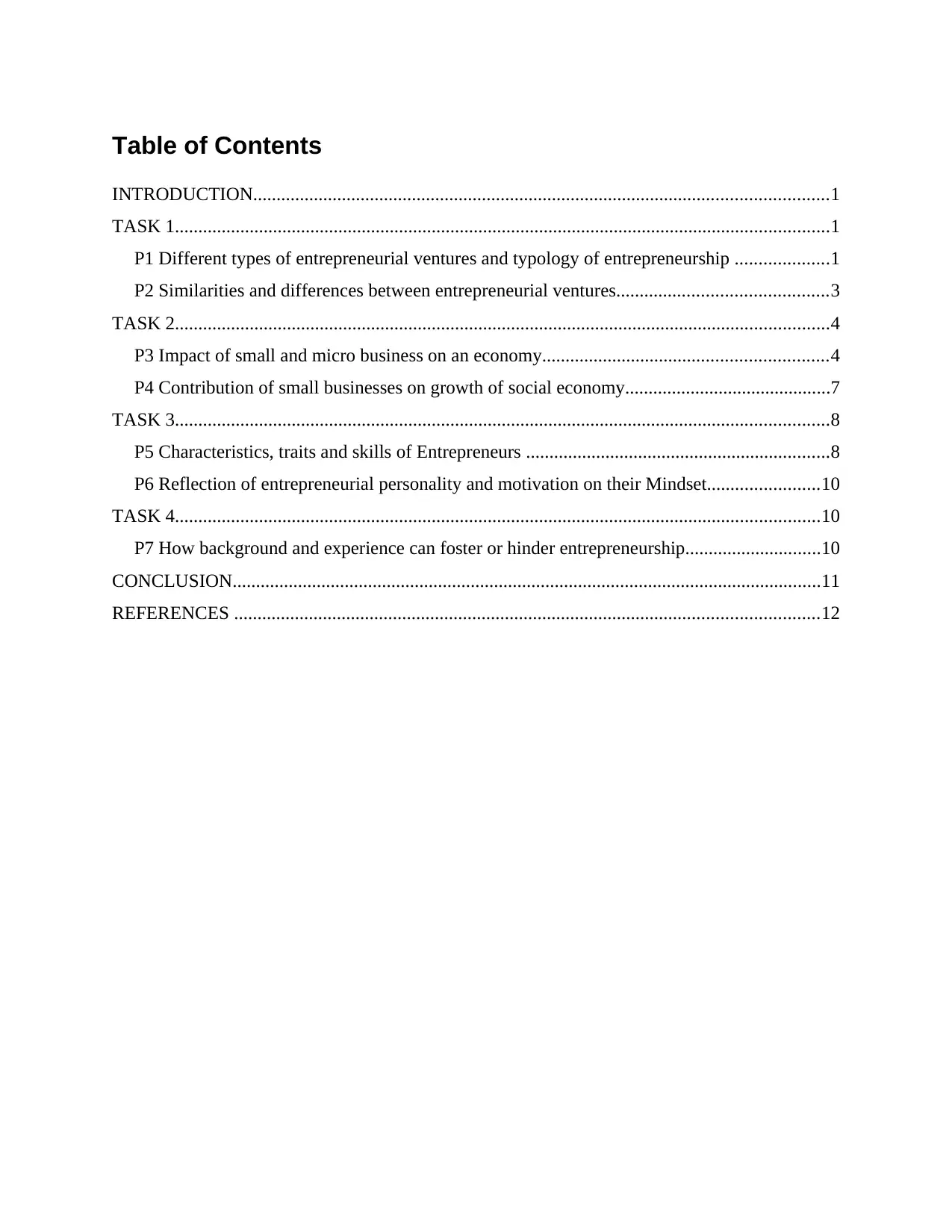
Table of Contents
INTRODUCTION...........................................................................................................................1
TASK 1............................................................................................................................................1
P1 Different types of entrepreneurial ventures and typology of entrepreneurship ....................1
P2 Similarities and differences between entrepreneurial ventures.............................................3
TASK 2............................................................................................................................................4
P3 Impact of small and micro business on an economy.............................................................4
P4 Contribution of small businesses on growth of social economy............................................7
TASK 3............................................................................................................................................8
P5 Characteristics, traits and skills of Entrepreneurs .................................................................8
P6 Reflection of entrepreneurial personality and motivation on their Mindset........................10
TASK 4..........................................................................................................................................10
P7 How background and experience can foster or hinder entrepreneurship.............................10
CONCLUSION..............................................................................................................................11
REFERENCES .............................................................................................................................12
INTRODUCTION...........................................................................................................................1
TASK 1............................................................................................................................................1
P1 Different types of entrepreneurial ventures and typology of entrepreneurship ....................1
P2 Similarities and differences between entrepreneurial ventures.............................................3
TASK 2............................................................................................................................................4
P3 Impact of small and micro business on an economy.............................................................4
P4 Contribution of small businesses on growth of social economy............................................7
TASK 3............................................................................................................................................8
P5 Characteristics, traits and skills of Entrepreneurs .................................................................8
P6 Reflection of entrepreneurial personality and motivation on their Mindset........................10
TASK 4..........................................................................................................................................10
P7 How background and experience can foster or hinder entrepreneurship.............................10
CONCLUSION..............................................................................................................................11
REFERENCES .............................................................................................................................12
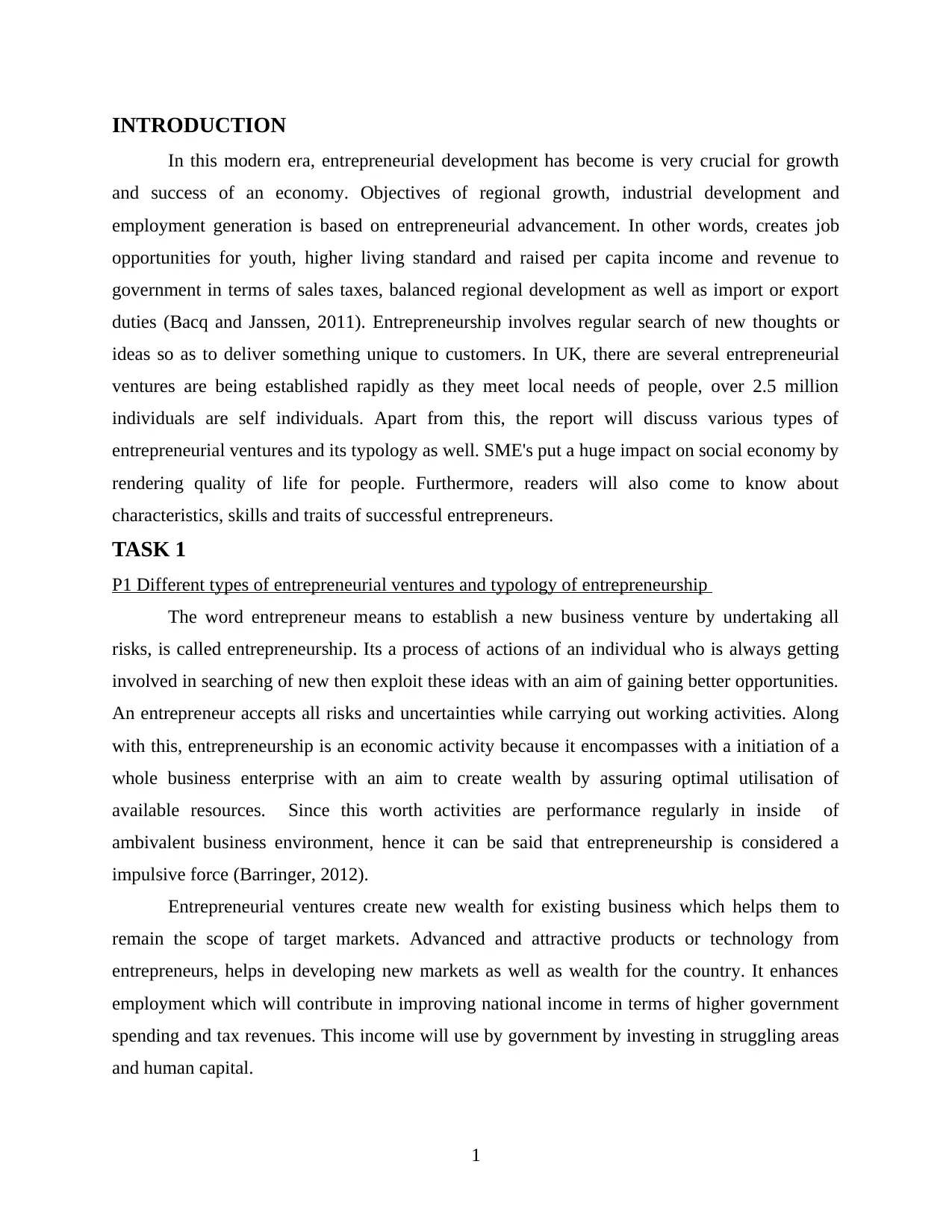
INTRODUCTION
In this modern era, entrepreneurial development has become is very crucial for growth
and success of an economy. Objectives of regional growth, industrial development and
employment generation is based on entrepreneurial advancement. In other words, creates job
opportunities for youth, higher living standard and raised per capita income and revenue to
government in terms of sales taxes, balanced regional development as well as import or export
duties (Bacq and Janssen, 2011). Entrepreneurship involves regular search of new thoughts or
ideas so as to deliver something unique to customers. In UK, there are several entrepreneurial
ventures are being established rapidly as they meet local needs of people, over 2.5 million
individuals are self individuals. Apart from this, the report will discuss various types of
entrepreneurial ventures and its typology as well. SME's put a huge impact on social economy by
rendering quality of life for people. Furthermore, readers will also come to know about
characteristics, skills and traits of successful entrepreneurs.
TASK 1
P1 Different types of entrepreneurial ventures and typology of entrepreneurship
The word entrepreneur means to establish a new business venture by undertaking all
risks, is called entrepreneurship. Its a process of actions of an individual who is always getting
involved in searching of new then exploit these ideas with an aim of gaining better opportunities.
An entrepreneur accepts all risks and uncertainties while carrying out working activities. Along
with this, entrepreneurship is an economic activity because it encompasses with a initiation of a
whole business enterprise with an aim to create wealth by assuring optimal utilisation of
available resources. Since this worth activities are performance regularly in inside of
ambivalent business environment, hence it can be said that entrepreneurship is considered a
impulsive force (Barringer, 2012).
Entrepreneurial ventures create new wealth for existing business which helps them to
remain the scope of target markets. Advanced and attractive products or technology from
entrepreneurs, helps in developing new markets as well as wealth for the country. It enhances
employment which will contribute in improving national income in terms of higher government
spending and tax revenues. This income will use by government by investing in struggling areas
and human capital.
1
In this modern era, entrepreneurial development has become is very crucial for growth
and success of an economy. Objectives of regional growth, industrial development and
employment generation is based on entrepreneurial advancement. In other words, creates job
opportunities for youth, higher living standard and raised per capita income and revenue to
government in terms of sales taxes, balanced regional development as well as import or export
duties (Bacq and Janssen, 2011). Entrepreneurship involves regular search of new thoughts or
ideas so as to deliver something unique to customers. In UK, there are several entrepreneurial
ventures are being established rapidly as they meet local needs of people, over 2.5 million
individuals are self individuals. Apart from this, the report will discuss various types of
entrepreneurial ventures and its typology as well. SME's put a huge impact on social economy by
rendering quality of life for people. Furthermore, readers will also come to know about
characteristics, skills and traits of successful entrepreneurs.
TASK 1
P1 Different types of entrepreneurial ventures and typology of entrepreneurship
The word entrepreneur means to establish a new business venture by undertaking all
risks, is called entrepreneurship. Its a process of actions of an individual who is always getting
involved in searching of new then exploit these ideas with an aim of gaining better opportunities.
An entrepreneur accepts all risks and uncertainties while carrying out working activities. Along
with this, entrepreneurship is an economic activity because it encompasses with a initiation of a
whole business enterprise with an aim to create wealth by assuring optimal utilisation of
available resources. Since this worth activities are performance regularly in inside of
ambivalent business environment, hence it can be said that entrepreneurship is considered a
impulsive force (Barringer, 2012).
Entrepreneurial ventures create new wealth for existing business which helps them to
remain the scope of target markets. Advanced and attractive products or technology from
entrepreneurs, helps in developing new markets as well as wealth for the country. It enhances
employment which will contribute in improving national income in terms of higher government
spending and tax revenues. This income will use by government by investing in struggling areas
and human capital.
1
⊘ This is a preview!⊘
Do you want full access?
Subscribe today to unlock all pages.

Trusted by 1+ million students worldwide
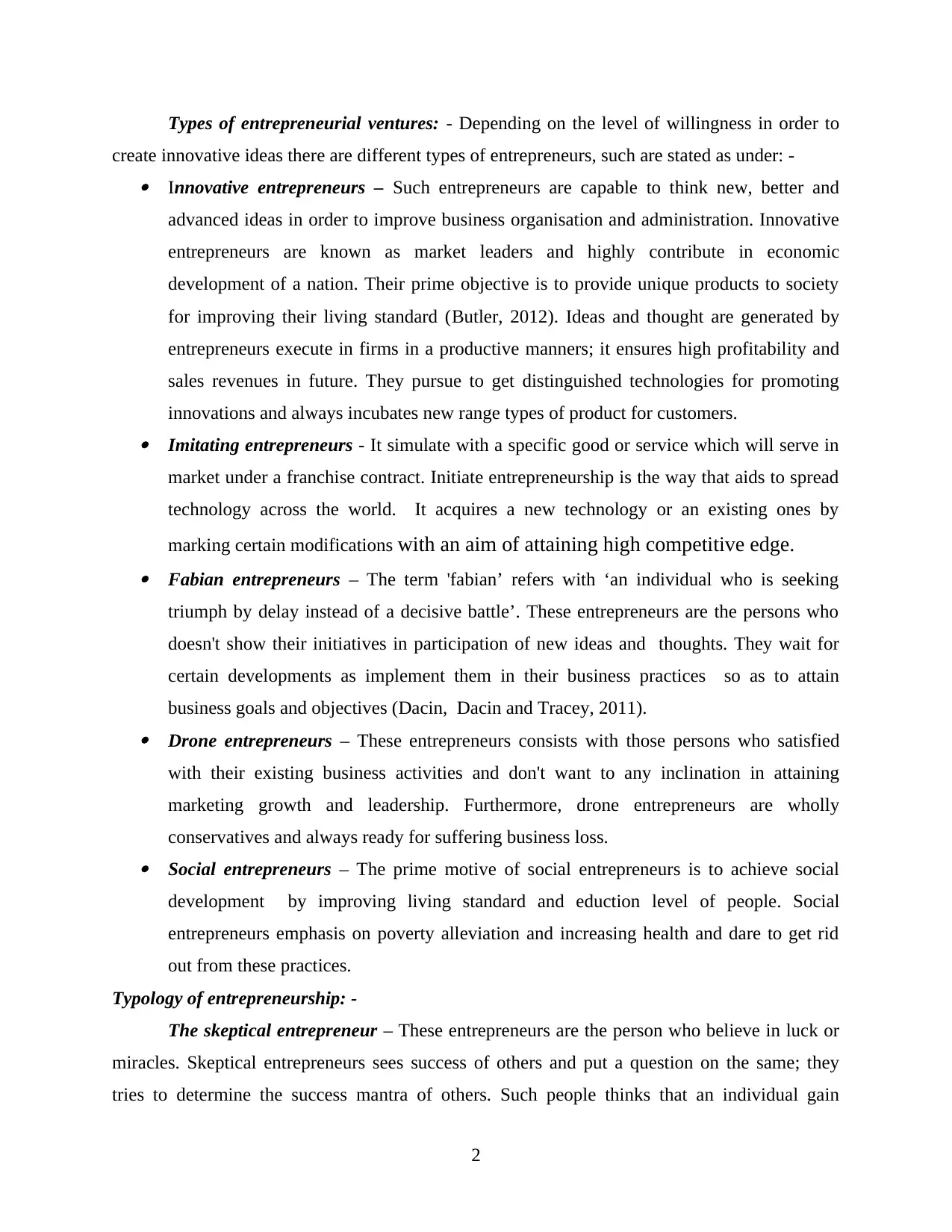
Types of entrepreneurial ventures: - Depending on the level of willingness in order to
create innovative ideas there are different types of entrepreneurs, such are stated as under: - Innovative entrepreneurs – Such entrepreneurs are capable to think new, better and
advanced ideas in order to improve business organisation and administration. Innovative
entrepreneurs are known as market leaders and highly contribute in economic
development of a nation. Their prime objective is to provide unique products to society
for improving their living standard (Butler, 2012). Ideas and thought are generated by
entrepreneurs execute in firms in a productive manners; it ensures high profitability and
sales revenues in future. They pursue to get distinguished technologies for promoting
innovations and always incubates new range types of product for customers. Imitating entrepreneurs - It simulate with a specific good or service which will serve in
market under a franchise contract. Initiate entrepreneurship is the way that aids to spread
technology across the world. It acquires a new technology or an existing ones by
marking certain modifications with an aim of attaining high competitive edge. Fabian entrepreneurs – The term 'fabian’ refers with ‘an individual who is seeking
triumph by delay instead of a decisive battle’. These entrepreneurs are the persons who
doesn't show their initiatives in participation of new ideas and thoughts. They wait for
certain developments as implement them in their business practices so as to attain
business goals and objectives (Dacin, Dacin and Tracey, 2011). Drone entrepreneurs – These entrepreneurs consists with those persons who satisfied
with their existing business activities and don't want to any inclination in attaining
marketing growth and leadership. Furthermore, drone entrepreneurs are wholly
conservatives and always ready for suffering business loss. Social entrepreneurs – The prime motive of social entrepreneurs is to achieve social
development by improving living standard and eduction level of people. Social
entrepreneurs emphasis on poverty alleviation and increasing health and dare to get rid
out from these practices.
Typology of entrepreneurship: -
The skeptical entrepreneur – These entrepreneurs are the person who believe in luck or
miracles. Skeptical entrepreneurs sees success of others and put a question on the same; they
tries to determine the success mantra of others. Such people thinks that an individual gain
2
create innovative ideas there are different types of entrepreneurs, such are stated as under: - Innovative entrepreneurs – Such entrepreneurs are capable to think new, better and
advanced ideas in order to improve business organisation and administration. Innovative
entrepreneurs are known as market leaders and highly contribute in economic
development of a nation. Their prime objective is to provide unique products to society
for improving their living standard (Butler, 2012). Ideas and thought are generated by
entrepreneurs execute in firms in a productive manners; it ensures high profitability and
sales revenues in future. They pursue to get distinguished technologies for promoting
innovations and always incubates new range types of product for customers. Imitating entrepreneurs - It simulate with a specific good or service which will serve in
market under a franchise contract. Initiate entrepreneurship is the way that aids to spread
technology across the world. It acquires a new technology or an existing ones by
marking certain modifications with an aim of attaining high competitive edge. Fabian entrepreneurs – The term 'fabian’ refers with ‘an individual who is seeking
triumph by delay instead of a decisive battle’. These entrepreneurs are the persons who
doesn't show their initiatives in participation of new ideas and thoughts. They wait for
certain developments as implement them in their business practices so as to attain
business goals and objectives (Dacin, Dacin and Tracey, 2011). Drone entrepreneurs – These entrepreneurs consists with those persons who satisfied
with their existing business activities and don't want to any inclination in attaining
marketing growth and leadership. Furthermore, drone entrepreneurs are wholly
conservatives and always ready for suffering business loss. Social entrepreneurs – The prime motive of social entrepreneurs is to achieve social
development by improving living standard and eduction level of people. Social
entrepreneurs emphasis on poverty alleviation and increasing health and dare to get rid
out from these practices.
Typology of entrepreneurship: -
The skeptical entrepreneur – These entrepreneurs are the person who believe in luck or
miracles. Skeptical entrepreneurs sees success of others and put a question on the same; they
tries to determine the success mantra of others. Such people thinks that an individual gain
2
Paraphrase This Document
Need a fresh take? Get an instant paraphrase of this document with our AI Paraphraser
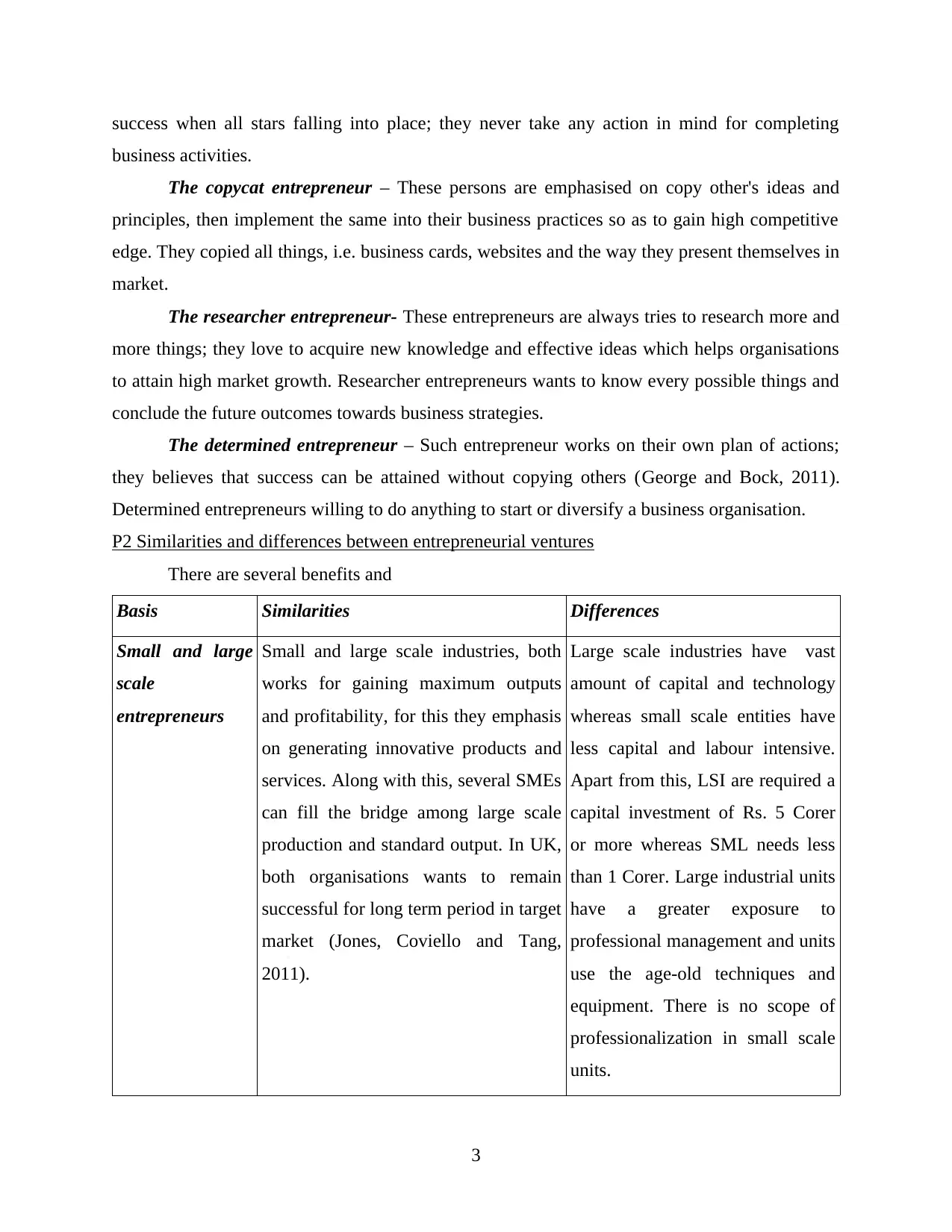
success when all stars falling into place; they never take any action in mind for completing
business activities.
The copycat entrepreneur – These persons are emphasised on copy other's ideas and
principles, then implement the same into their business practices so as to gain high competitive
edge. They copied all things, i.e. business cards, websites and the way they present themselves in
market.
The researcher entrepreneur- These entrepreneurs are always tries to research more and
more things; they love to acquire new knowledge and effective ideas which helps organisations
to attain high market growth. Researcher entrepreneurs wants to know every possible things and
conclude the future outcomes towards business strategies.
The determined entrepreneur – Such entrepreneur works on their own plan of actions;
they believes that success can be attained without copying others (George and Bock, 2011).
Determined entrepreneurs willing to do anything to start or diversify a business organisation.
P2 Similarities and differences between entrepreneurial ventures
There are several benefits and
Basis Similarities Differences
Small and large
scale
entrepreneurs
Small and large scale industries, both
works for gaining maximum outputs
and profitability, for this they emphasis
on generating innovative products and
services. Along with this, several SMEs
can fill the bridge among large scale
production and standard output. In UK,
both organisations wants to remain
successful for long term period in target
market (Jones, Coviello and Tang,
2011).
Large scale industries have vast
amount of capital and technology
whereas small scale entities have
less capital and labour intensive.
Apart from this, LSI are required a
capital investment of Rs. 5 Corer
or more whereas SML needs less
than 1 Corer. Large industrial units
have a greater exposure to
professional management and units
use the age-old techniques and
equipment. There is no scope of
professionalization in small scale
units.
3
business activities.
The copycat entrepreneur – These persons are emphasised on copy other's ideas and
principles, then implement the same into their business practices so as to gain high competitive
edge. They copied all things, i.e. business cards, websites and the way they present themselves in
market.
The researcher entrepreneur- These entrepreneurs are always tries to research more and
more things; they love to acquire new knowledge and effective ideas which helps organisations
to attain high market growth. Researcher entrepreneurs wants to know every possible things and
conclude the future outcomes towards business strategies.
The determined entrepreneur – Such entrepreneur works on their own plan of actions;
they believes that success can be attained without copying others (George and Bock, 2011).
Determined entrepreneurs willing to do anything to start or diversify a business organisation.
P2 Similarities and differences between entrepreneurial ventures
There are several benefits and
Basis Similarities Differences
Small and large
scale
entrepreneurs
Small and large scale industries, both
works for gaining maximum outputs
and profitability, for this they emphasis
on generating innovative products and
services. Along with this, several SMEs
can fill the bridge among large scale
production and standard output. In UK,
both organisations wants to remain
successful for long term period in target
market (Jones, Coviello and Tang,
2011).
Large scale industries have vast
amount of capital and technology
whereas small scale entities have
less capital and labour intensive.
Apart from this, LSI are required a
capital investment of Rs. 5 Corer
or more whereas SML needs less
than 1 Corer. Large industrial units
have a greater exposure to
professional management and units
use the age-old techniques and
equipment. There is no scope of
professionalization in small scale
units.
3
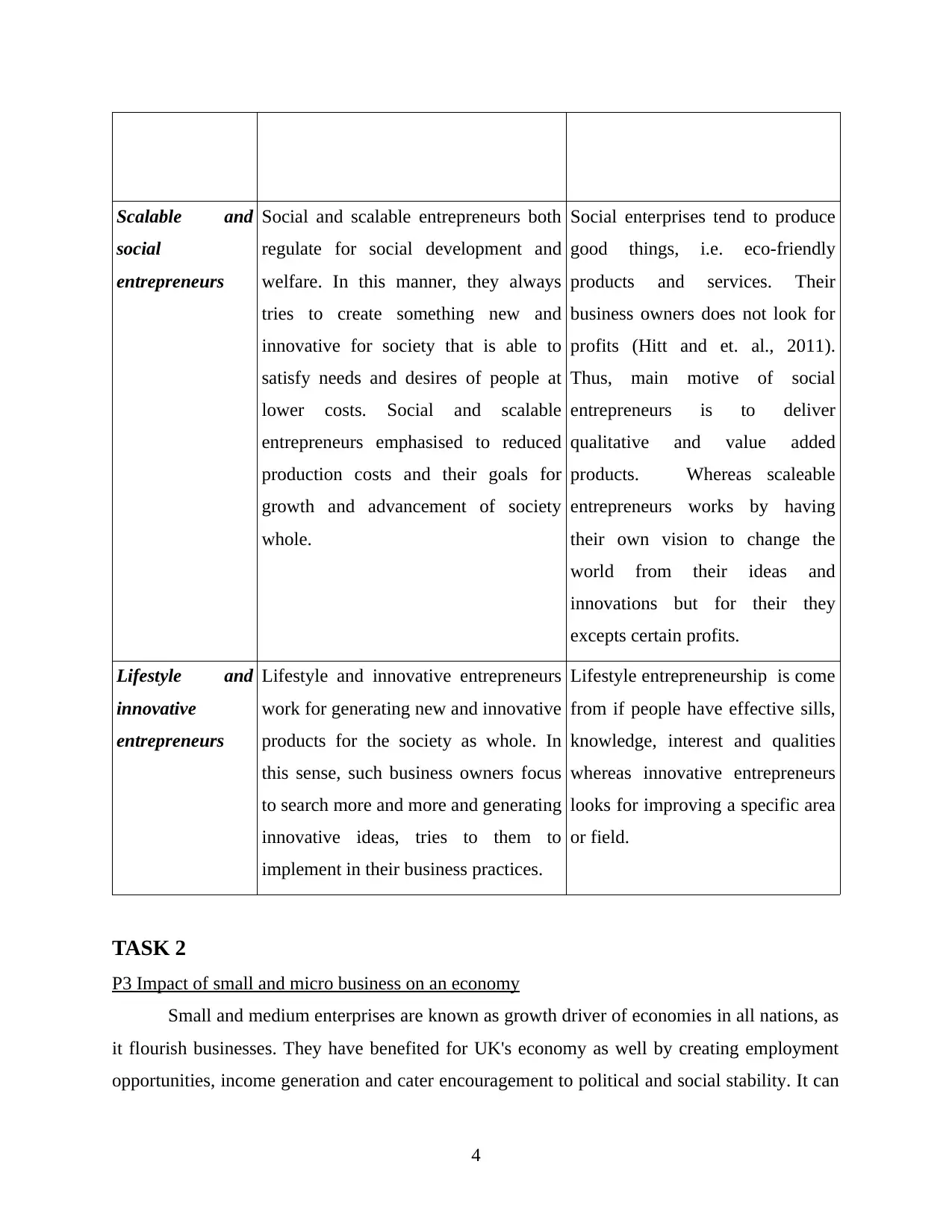
Scalable and
social
entrepreneurs
Social and scalable entrepreneurs both
regulate for social development and
welfare. In this manner, they always
tries to create something new and
innovative for society that is able to
satisfy needs and desires of people at
lower costs. Social and scalable
entrepreneurs emphasised to reduced
production costs and their goals for
growth and advancement of society
whole.
Social enterprises tend to produce
good things, i.e. eco-friendly
products and services. Their
business owners does not look for
profits (Hitt and et. al., 2011).
Thus, main motive of social
entrepreneurs is to deliver
qualitative and value added
products. Whereas scaleable
entrepreneurs works by having
their own vision to change the
world from their ideas and
innovations but for their they
excepts certain profits.
Lifestyle and
innovative
entrepreneurs
Lifestyle and innovative entrepreneurs
work for generating new and innovative
products for the society as whole. In
this sense, such business owners focus
to search more and more and generating
innovative ideas, tries to them to
implement in their business practices.
Lifestyle entrepreneurship is come
from if people have effective sills,
knowledge, interest and qualities
whereas innovative entrepreneurs
looks for improving a specific area
or field.
TASK 2
P3 Impact of small and micro business on an economy
Small and medium enterprises are known as growth driver of economies in all nations, as
it flourish businesses. They have benefited for UK's economy as well by creating employment
opportunities, income generation and cater encouragement to political and social stability. It can
4
social
entrepreneurs
Social and scalable entrepreneurs both
regulate for social development and
welfare. In this manner, they always
tries to create something new and
innovative for society that is able to
satisfy needs and desires of people at
lower costs. Social and scalable
entrepreneurs emphasised to reduced
production costs and their goals for
growth and advancement of society
whole.
Social enterprises tend to produce
good things, i.e. eco-friendly
products and services. Their
business owners does not look for
profits (Hitt and et. al., 2011).
Thus, main motive of social
entrepreneurs is to deliver
qualitative and value added
products. Whereas scaleable
entrepreneurs works by having
their own vision to change the
world from their ideas and
innovations but for their they
excepts certain profits.
Lifestyle and
innovative
entrepreneurs
Lifestyle and innovative entrepreneurs
work for generating new and innovative
products for the society as whole. In
this sense, such business owners focus
to search more and more and generating
innovative ideas, tries to them to
implement in their business practices.
Lifestyle entrepreneurship is come
from if people have effective sills,
knowledge, interest and qualities
whereas innovative entrepreneurs
looks for improving a specific area
or field.
TASK 2
P3 Impact of small and micro business on an economy
Small and medium enterprises are known as growth driver of economies in all nations, as
it flourish businesses. They have benefited for UK's economy as well by creating employment
opportunities, income generation and cater encouragement to political and social stability. It can
4
⊘ This is a preview!⊘
Do you want full access?
Subscribe today to unlock all pages.

Trusted by 1+ million students worldwide
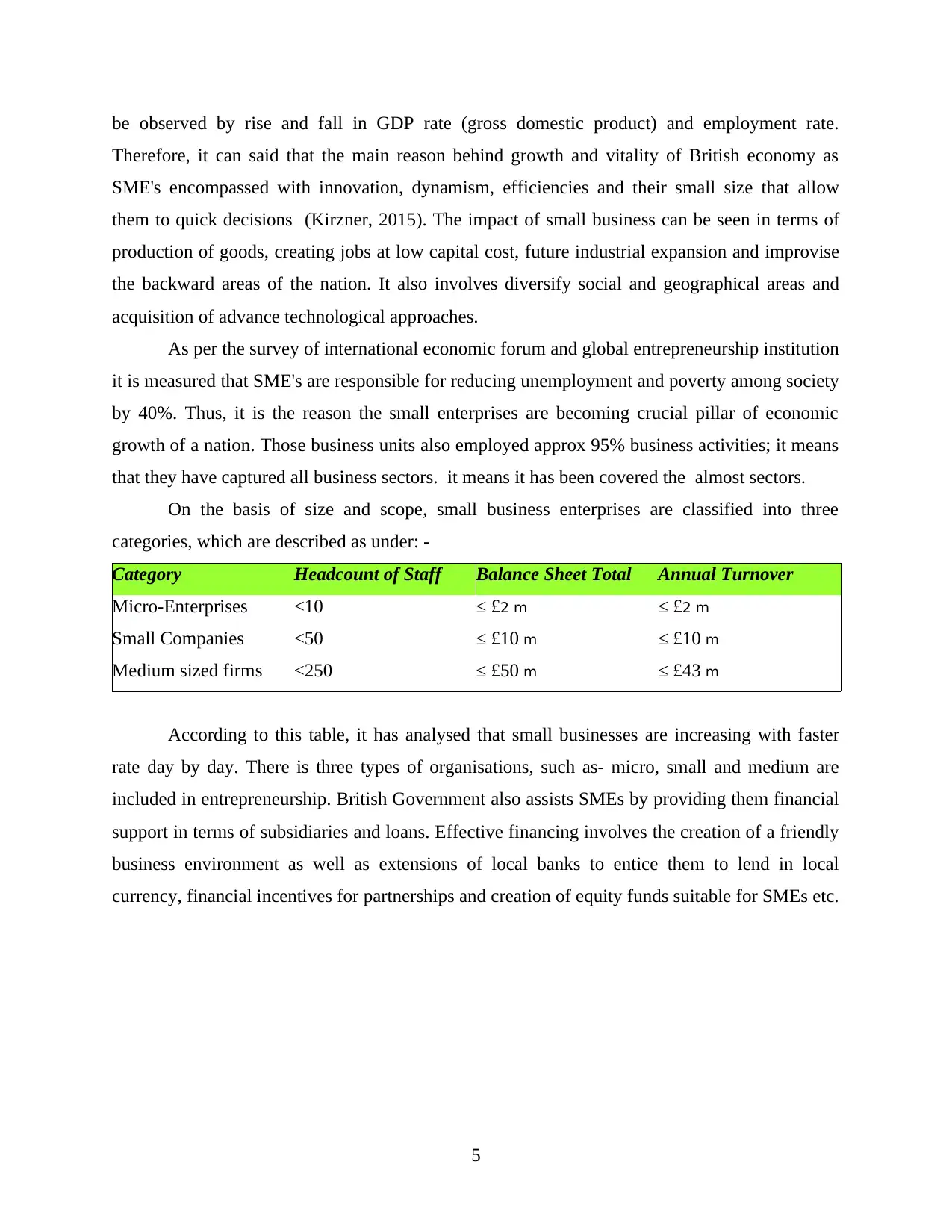
be observed by rise and fall in GDP rate (gross domestic product) and employment rate.
Therefore, it can said that the main reason behind growth and vitality of British economy as
SME's encompassed with innovation, dynamism, efficiencies and their small size that allow
them to quick decisions (Kirzner, 2015). The impact of small business can be seen in terms of
production of goods, creating jobs at low capital cost, future industrial expansion and improvise
the backward areas of the nation. It also involves diversify social and geographical areas and
acquisition of advance technological approaches.
As per the survey of international economic forum and global entrepreneurship institution
it is measured that SME's are responsible for reducing unemployment and poverty among society
by 40%. Thus, it is the reason the small enterprises are becoming crucial pillar of economic
growth of a nation. Those business units also employed approx 95% business activities; it means
that they have captured all business sectors. it means it has been covered the almost sectors.
On the basis of size and scope, small business enterprises are classified into three
categories, which are described as under: -
Category Headcount of Staff Balance Sheet Total Annual Turnover
Micro-Enterprises <10 ≤ £2 m ≤ £2 m
Small Companies <50 ≤ £10 m ≤ £10 m
Medium sized firms <250 ≤ £50 m ≤ £43 m
According to this table, it has analysed that small businesses are increasing with faster
rate day by day. There is three types of organisations, such as- micro, small and medium are
included in entrepreneurship. British Government also assists SMEs by providing them financial
support in terms of subsidiaries and loans. Effective financing involves the creation of a friendly
business environment as well as extensions of local banks to entice them to lend in local
currency, financial incentives for partnerships and creation of equity funds suitable for SMEs etc.
5
Therefore, it can said that the main reason behind growth and vitality of British economy as
SME's encompassed with innovation, dynamism, efficiencies and their small size that allow
them to quick decisions (Kirzner, 2015). The impact of small business can be seen in terms of
production of goods, creating jobs at low capital cost, future industrial expansion and improvise
the backward areas of the nation. It also involves diversify social and geographical areas and
acquisition of advance technological approaches.
As per the survey of international economic forum and global entrepreneurship institution
it is measured that SME's are responsible for reducing unemployment and poverty among society
by 40%. Thus, it is the reason the small enterprises are becoming crucial pillar of economic
growth of a nation. Those business units also employed approx 95% business activities; it means
that they have captured all business sectors. it means it has been covered the almost sectors.
On the basis of size and scope, small business enterprises are classified into three
categories, which are described as under: -
Category Headcount of Staff Balance Sheet Total Annual Turnover
Micro-Enterprises <10 ≤ £2 m ≤ £2 m
Small Companies <50 ≤ £10 m ≤ £10 m
Medium sized firms <250 ≤ £50 m ≤ £43 m
According to this table, it has analysed that small businesses are increasing with faster
rate day by day. There is three types of organisations, such as- micro, small and medium are
included in entrepreneurship. British Government also assists SMEs by providing them financial
support in terms of subsidiaries and loans. Effective financing involves the creation of a friendly
business environment as well as extensions of local banks to entice them to lend in local
currency, financial incentives for partnerships and creation of equity funds suitable for SMEs etc.
5
Paraphrase This Document
Need a fresh take? Get an instant paraphrase of this document with our AI Paraphraser
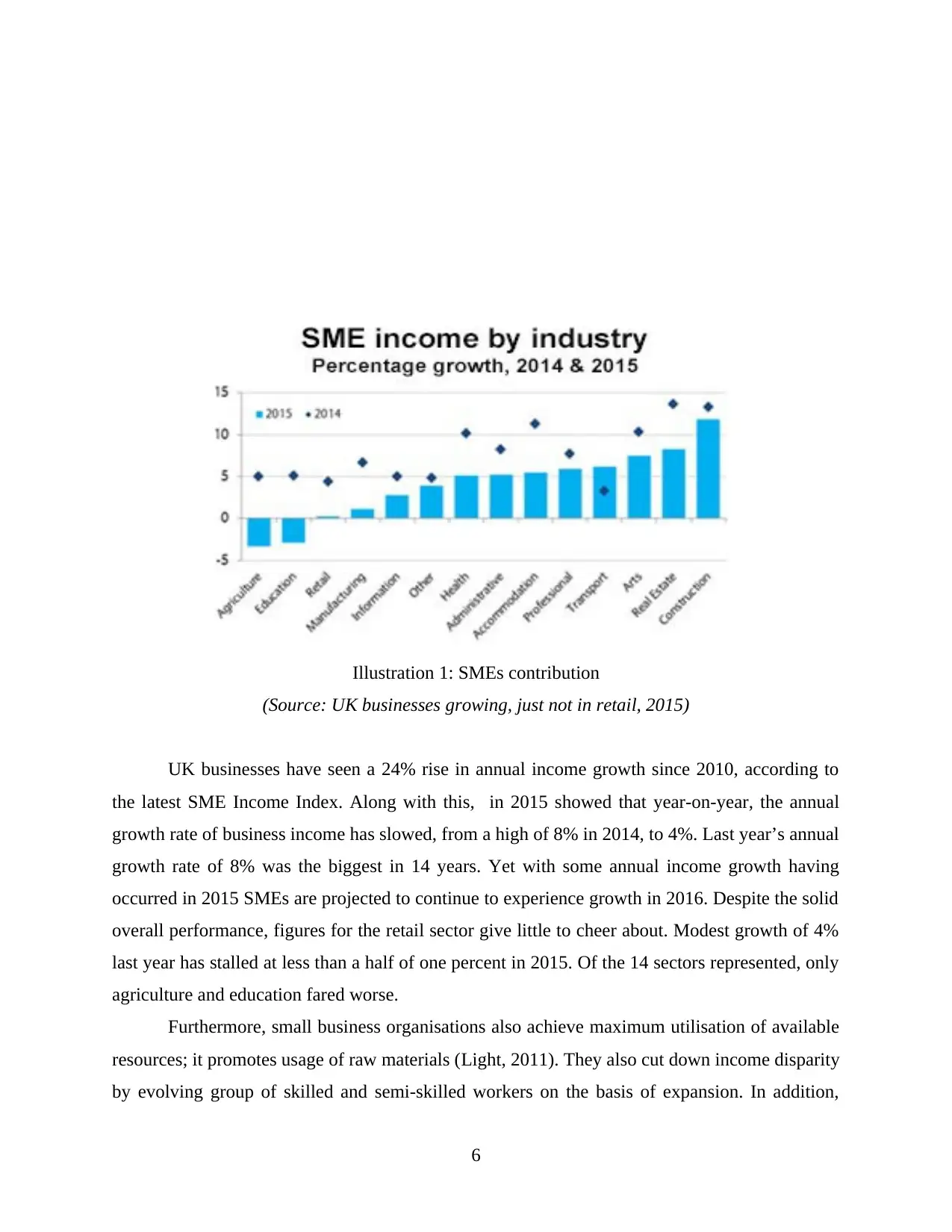
(Source: UK businesses growing, just not in retail, 2015)
UK businesses have seen a 24% rise in annual income growth since 2010, according to
the latest SME Income Index. Along with this, in 2015 showed that year-on-year, the annual
growth rate of business income has slowed, from a high of 8% in 2014, to 4%. Last year’s annual
growth rate of 8% was the biggest in 14 years. Yet with some annual income growth having
occurred in 2015 SMEs are projected to continue to experience growth in 2016. Despite the solid
overall performance, figures for the retail sector give little to cheer about. Modest growth of 4%
last year has stalled at less than a half of one percent in 2015. Of the 14 sectors represented, only
agriculture and education fared worse.
Furthermore, small business organisations also achieve maximum utilisation of available
resources; it promotes usage of raw materials (Light, 2011). They also cut down income disparity
by evolving group of skilled and semi-skilled workers on the basis of expansion. In addition,
6
Illustration 1: SMEs contribution
UK businesses have seen a 24% rise in annual income growth since 2010, according to
the latest SME Income Index. Along with this, in 2015 showed that year-on-year, the annual
growth rate of business income has slowed, from a high of 8% in 2014, to 4%. Last year’s annual
growth rate of 8% was the biggest in 14 years. Yet with some annual income growth having
occurred in 2015 SMEs are projected to continue to experience growth in 2016. Despite the solid
overall performance, figures for the retail sector give little to cheer about. Modest growth of 4%
last year has stalled at less than a half of one percent in 2015. Of the 14 sectors represented, only
agriculture and education fared worse.
Furthermore, small business organisations also achieve maximum utilisation of available
resources; it promotes usage of raw materials (Light, 2011). They also cut down income disparity
by evolving group of skilled and semi-skilled workers on the basis of expansion. In addition,
6
Illustration 1: SMEs contribution
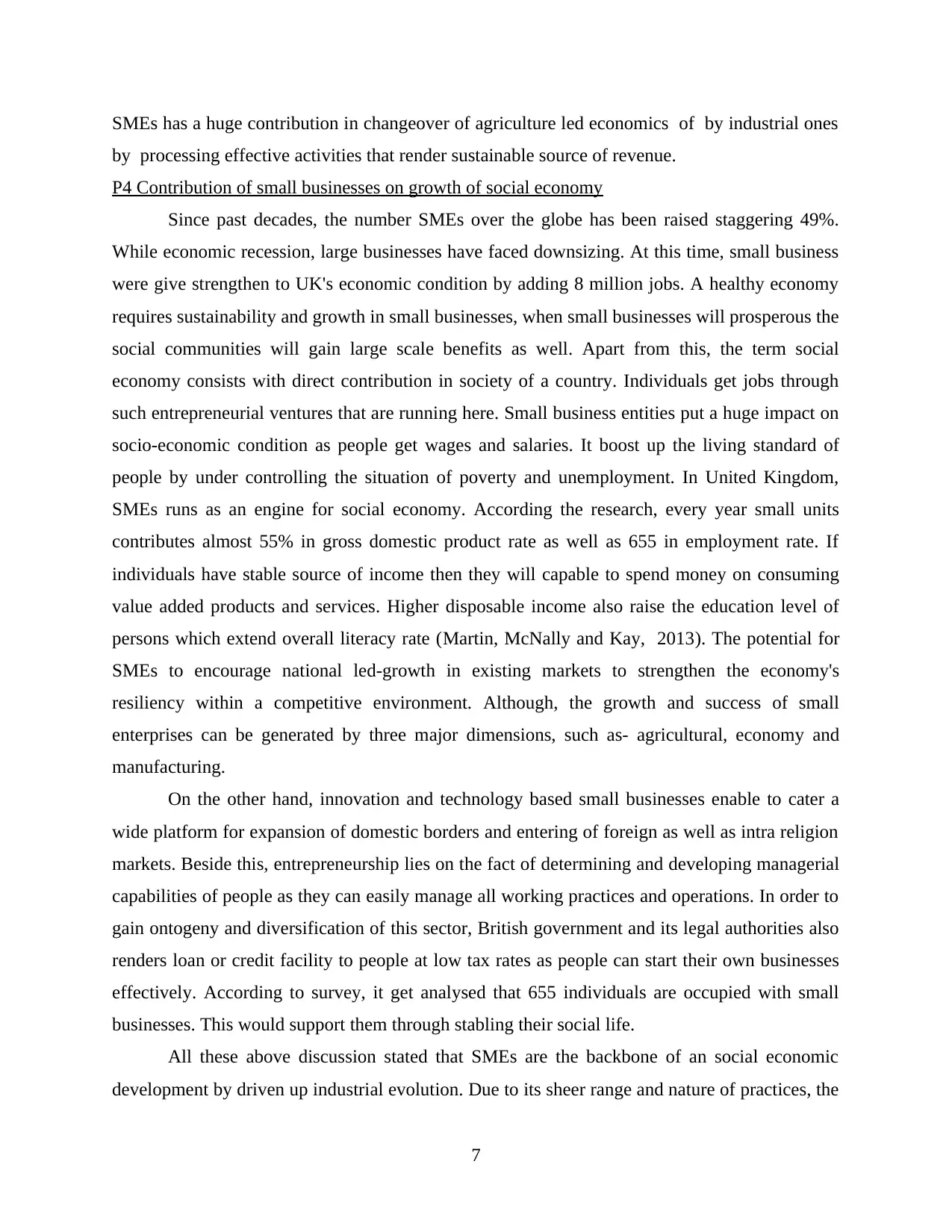
SMEs has a huge contribution in changeover of agriculture led economics of by industrial ones
by processing effective activities that render sustainable source of revenue.
P4 Contribution of small businesses on growth of social economy
Since past decades, the number SMEs over the globe has been raised staggering 49%.
While economic recession, large businesses have faced downsizing. At this time, small business
were give strengthen to UK's economic condition by adding 8 million jobs. A healthy economy
requires sustainability and growth in small businesses, when small businesses will prosperous the
social communities will gain large scale benefits as well. Apart from this, the term social
economy consists with direct contribution in society of a country. Individuals get jobs through
such entrepreneurial ventures that are running here. Small business entities put a huge impact on
socio-economic condition as people get wages and salaries. It boost up the living standard of
people by under controlling the situation of poverty and unemployment. In United Kingdom,
SMEs runs as an engine for social economy. According the research, every year small units
contributes almost 55% in gross domestic product rate as well as 655 in employment rate. If
individuals have stable source of income then they will capable to spend money on consuming
value added products and services. Higher disposable income also raise the education level of
persons which extend overall literacy rate (Martin, McNally and Kay, 2013). The potential for
SMEs to encourage national led-growth in existing markets to strengthen the economy's
resiliency within a competitive environment. Although, the growth and success of small
enterprises can be generated by three major dimensions, such as- agricultural, economy and
manufacturing.
On the other hand, innovation and technology based small businesses enable to cater a
wide platform for expansion of domestic borders and entering of foreign as well as intra religion
markets. Beside this, entrepreneurship lies on the fact of determining and developing managerial
capabilities of people as they can easily manage all working practices and operations. In order to
gain ontogeny and diversification of this sector, British government and its legal authorities also
renders loan or credit facility to people at low tax rates as people can start their own businesses
effectively. According to survey, it get analysed that 655 individuals are occupied with small
businesses. This would support them through stabling their social life.
All these above discussion stated that SMEs are the backbone of an social economic
development by driven up industrial evolution. Due to its sheer range and nature of practices, the
7
by processing effective activities that render sustainable source of revenue.
P4 Contribution of small businesses on growth of social economy
Since past decades, the number SMEs over the globe has been raised staggering 49%.
While economic recession, large businesses have faced downsizing. At this time, small business
were give strengthen to UK's economic condition by adding 8 million jobs. A healthy economy
requires sustainability and growth in small businesses, when small businesses will prosperous the
social communities will gain large scale benefits as well. Apart from this, the term social
economy consists with direct contribution in society of a country. Individuals get jobs through
such entrepreneurial ventures that are running here. Small business entities put a huge impact on
socio-economic condition as people get wages and salaries. It boost up the living standard of
people by under controlling the situation of poverty and unemployment. In United Kingdom,
SMEs runs as an engine for social economy. According the research, every year small units
contributes almost 55% in gross domestic product rate as well as 655 in employment rate. If
individuals have stable source of income then they will capable to spend money on consuming
value added products and services. Higher disposable income also raise the education level of
persons which extend overall literacy rate (Martin, McNally and Kay, 2013). The potential for
SMEs to encourage national led-growth in existing markets to strengthen the economy's
resiliency within a competitive environment. Although, the growth and success of small
enterprises can be generated by three major dimensions, such as- agricultural, economy and
manufacturing.
On the other hand, innovation and technology based small businesses enable to cater a
wide platform for expansion of domestic borders and entering of foreign as well as intra religion
markets. Beside this, entrepreneurship lies on the fact of determining and developing managerial
capabilities of people as they can easily manage all working practices and operations. In order to
gain ontogeny and diversification of this sector, British government and its legal authorities also
renders loan or credit facility to people at low tax rates as people can start their own businesses
effectively. According to survey, it get analysed that 655 individuals are occupied with small
businesses. This would support them through stabling their social life.
All these above discussion stated that SMEs are the backbone of an social economic
development by driven up industrial evolution. Due to its sheer range and nature of practices, the
7
⊘ This is a preview!⊘
Do you want full access?
Subscribe today to unlock all pages.

Trusted by 1+ million students worldwide
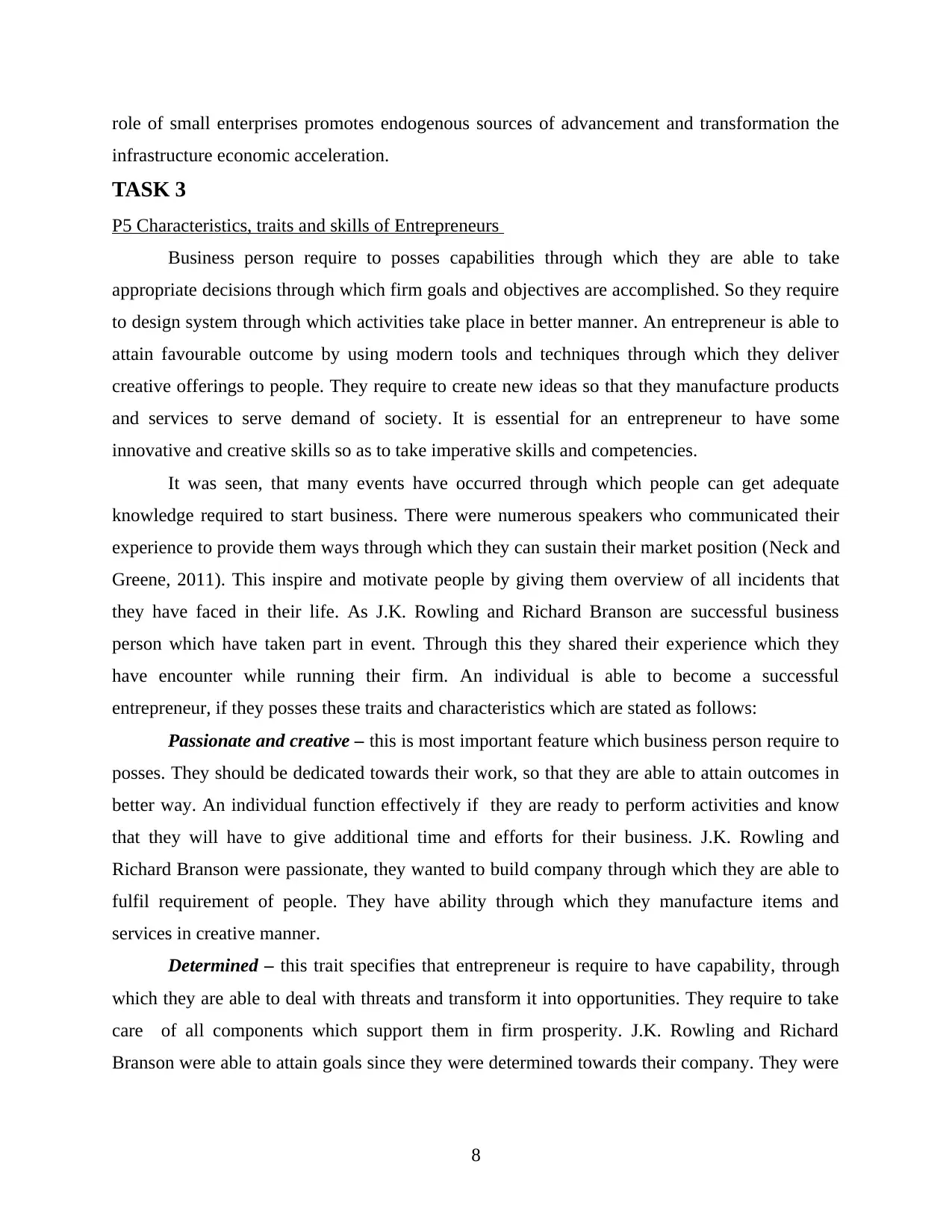
role of small enterprises promotes endogenous sources of advancement and transformation the
infrastructure economic acceleration.
TASK 3
P5 Characteristics, traits and skills of Entrepreneurs
Business person require to posses capabilities through which they are able to take
appropriate decisions through which firm goals and objectives are accomplished. So they require
to design system through which activities take place in better manner. An entrepreneur is able to
attain favourable outcome by using modern tools and techniques through which they deliver
creative offerings to people. They require to create new ideas so that they manufacture products
and services to serve demand of society. It is essential for an entrepreneur to have some
innovative and creative skills so as to take imperative skills and competencies.
It was seen, that many events have occurred through which people can get adequate
knowledge required to start business. There were numerous speakers who communicated their
experience to provide them ways through which they can sustain their market position (Neck and
Greene, 2011). This inspire and motivate people by giving them overview of all incidents that
they have faced in their life. As J.K. Rowling and Richard Branson are successful business
person which have taken part in event. Through this they shared their experience which they
have encounter while running their firm. An individual is able to become a successful
entrepreneur, if they posses these traits and characteristics which are stated as follows:
Passionate and creative – this is most important feature which business person require to
posses. They should be dedicated towards their work, so that they are able to attain outcomes in
better way. An individual function effectively if they are ready to perform activities and know
that they will have to give additional time and efforts for their business. J.K. Rowling and
Richard Branson were passionate, they wanted to build company through which they are able to
fulfil requirement of people. They have ability through which they manufacture items and
services in creative manner.
Determined – this trait specifies that entrepreneur is require to have capability, through
which they are able to deal with threats and transform it into opportunities. They require to take
care of all components which support them in firm prosperity. J.K. Rowling and Richard
Branson were able to attain goals since they were determined towards their company. They were
8
infrastructure economic acceleration.
TASK 3
P5 Characteristics, traits and skills of Entrepreneurs
Business person require to posses capabilities through which they are able to take
appropriate decisions through which firm goals and objectives are accomplished. So they require
to design system through which activities take place in better manner. An entrepreneur is able to
attain favourable outcome by using modern tools and techniques through which they deliver
creative offerings to people. They require to create new ideas so that they manufacture products
and services to serve demand of society. It is essential for an entrepreneur to have some
innovative and creative skills so as to take imperative skills and competencies.
It was seen, that many events have occurred through which people can get adequate
knowledge required to start business. There were numerous speakers who communicated their
experience to provide them ways through which they can sustain their market position (Neck and
Greene, 2011). This inspire and motivate people by giving them overview of all incidents that
they have faced in their life. As J.K. Rowling and Richard Branson are successful business
person which have taken part in event. Through this they shared their experience which they
have encounter while running their firm. An individual is able to become a successful
entrepreneur, if they posses these traits and characteristics which are stated as follows:
Passionate and creative – this is most important feature which business person require to
posses. They should be dedicated towards their work, so that they are able to attain outcomes in
better way. An individual function effectively if they are ready to perform activities and know
that they will have to give additional time and efforts for their business. J.K. Rowling and
Richard Branson were passionate, they wanted to build company through which they are able to
fulfil requirement of people. They have ability through which they manufacture items and
services in creative manner.
Determined – this trait specifies that entrepreneur is require to have capability, through
which they are able to deal with threats and transform it into opportunities. They require to take
care of all components which support them in firm prosperity. J.K. Rowling and Richard
Branson were able to attain goals since they were determined towards their company. They were
8
Paraphrase This Document
Need a fresh take? Get an instant paraphrase of this document with our AI Paraphraser
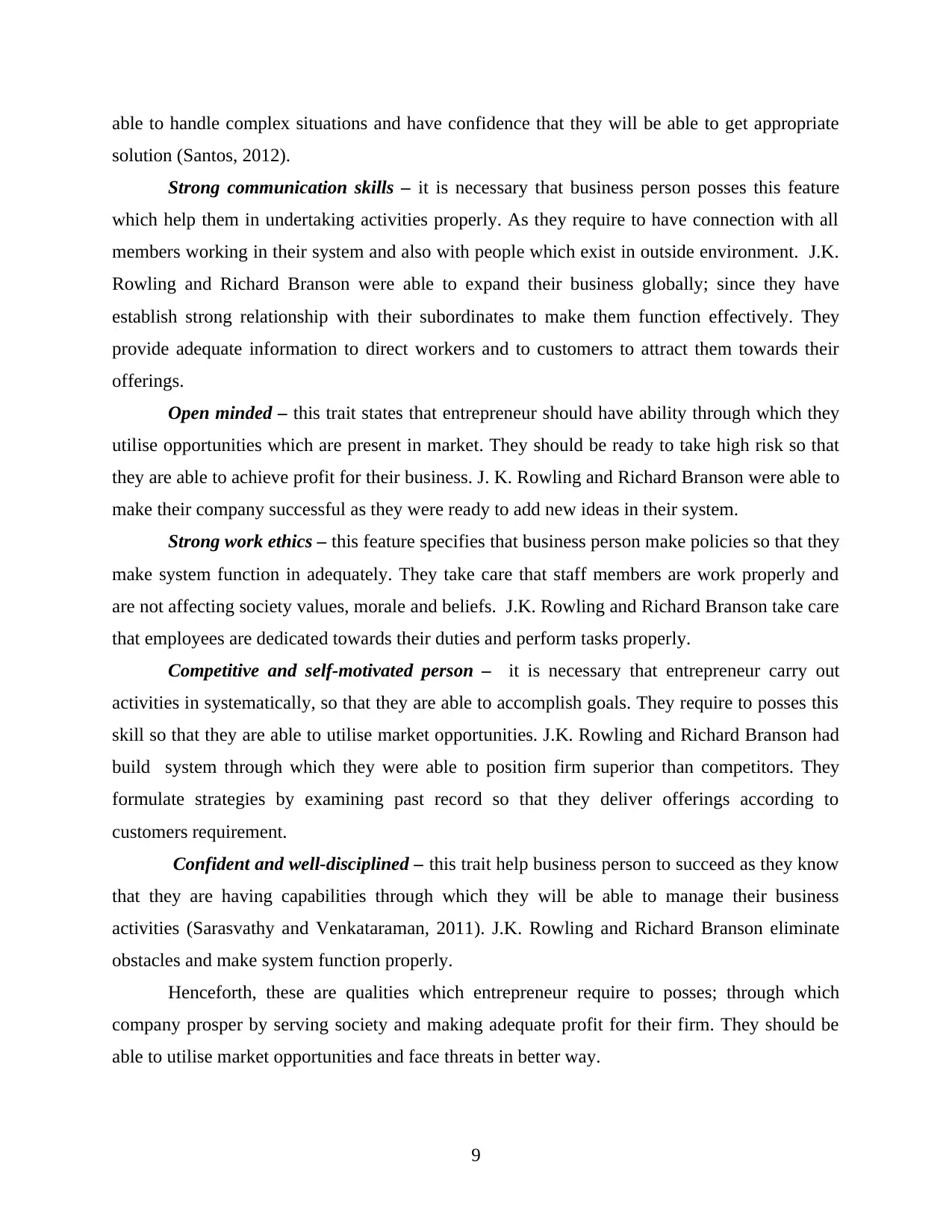
able to handle complex situations and have confidence that they will be able to get appropriate
solution (Santos, 2012).
Strong communication skills – it is necessary that business person posses this feature
which help them in undertaking activities properly. As they require to have connection with all
members working in their system and also with people which exist in outside environment. J.K.
Rowling and Richard Branson were able to expand their business globally; since they have
establish strong relationship with their subordinates to make them function effectively. They
provide adequate information to direct workers and to customers to attract them towards their
offerings.
Open minded – this trait states that entrepreneur should have ability through which they
utilise opportunities which are present in market. They should be ready to take high risk so that
they are able to achieve profit for their business. J. K. Rowling and Richard Branson were able to
make their company successful as they were ready to add new ideas in their system.
Strong work ethics – this feature specifies that business person make policies so that they
make system function in adequately. They take care that staff members are work properly and
are not affecting society values, morale and beliefs. J.K. Rowling and Richard Branson take care
that employees are dedicated towards their duties and perform tasks properly.
Competitive and self-motivated person – it is necessary that entrepreneur carry out
activities in systematically, so that they are able to accomplish goals. They require to posses this
skill so that they are able to utilise market opportunities. J.K. Rowling and Richard Branson had
build system through which they were able to position firm superior than competitors. They
formulate strategies by examining past record so that they deliver offerings according to
customers requirement.
Confident and well-disciplined – this trait help business person to succeed as they know
that they are having capabilities through which they will be able to manage their business
activities (Sarasvathy and Venkataraman, 2011). J.K. Rowling and Richard Branson eliminate
obstacles and make system function properly.
Henceforth, these are qualities which entrepreneur require to posses; through which
company prosper by serving society and making adequate profit for their firm. They should be
able to utilise market opportunities and face threats in better way.
9
solution (Santos, 2012).
Strong communication skills – it is necessary that business person posses this feature
which help them in undertaking activities properly. As they require to have connection with all
members working in their system and also with people which exist in outside environment. J.K.
Rowling and Richard Branson were able to expand their business globally; since they have
establish strong relationship with their subordinates to make them function effectively. They
provide adequate information to direct workers and to customers to attract them towards their
offerings.
Open minded – this trait states that entrepreneur should have ability through which they
utilise opportunities which are present in market. They should be ready to take high risk so that
they are able to achieve profit for their business. J. K. Rowling and Richard Branson were able to
make their company successful as they were ready to add new ideas in their system.
Strong work ethics – this feature specifies that business person make policies so that they
make system function in adequately. They take care that staff members are work properly and
are not affecting society values, morale and beliefs. J.K. Rowling and Richard Branson take care
that employees are dedicated towards their duties and perform tasks properly.
Competitive and self-motivated person – it is necessary that entrepreneur carry out
activities in systematically, so that they are able to accomplish goals. They require to posses this
skill so that they are able to utilise market opportunities. J.K. Rowling and Richard Branson had
build system through which they were able to position firm superior than competitors. They
formulate strategies by examining past record so that they deliver offerings according to
customers requirement.
Confident and well-disciplined – this trait help business person to succeed as they know
that they are having capabilities through which they will be able to manage their business
activities (Sarasvathy and Venkataraman, 2011). J.K. Rowling and Richard Branson eliminate
obstacles and make system function properly.
Henceforth, these are qualities which entrepreneur require to posses; through which
company prosper by serving society and making adequate profit for their firm. They should be
able to utilise market opportunities and face threats in better way.
9
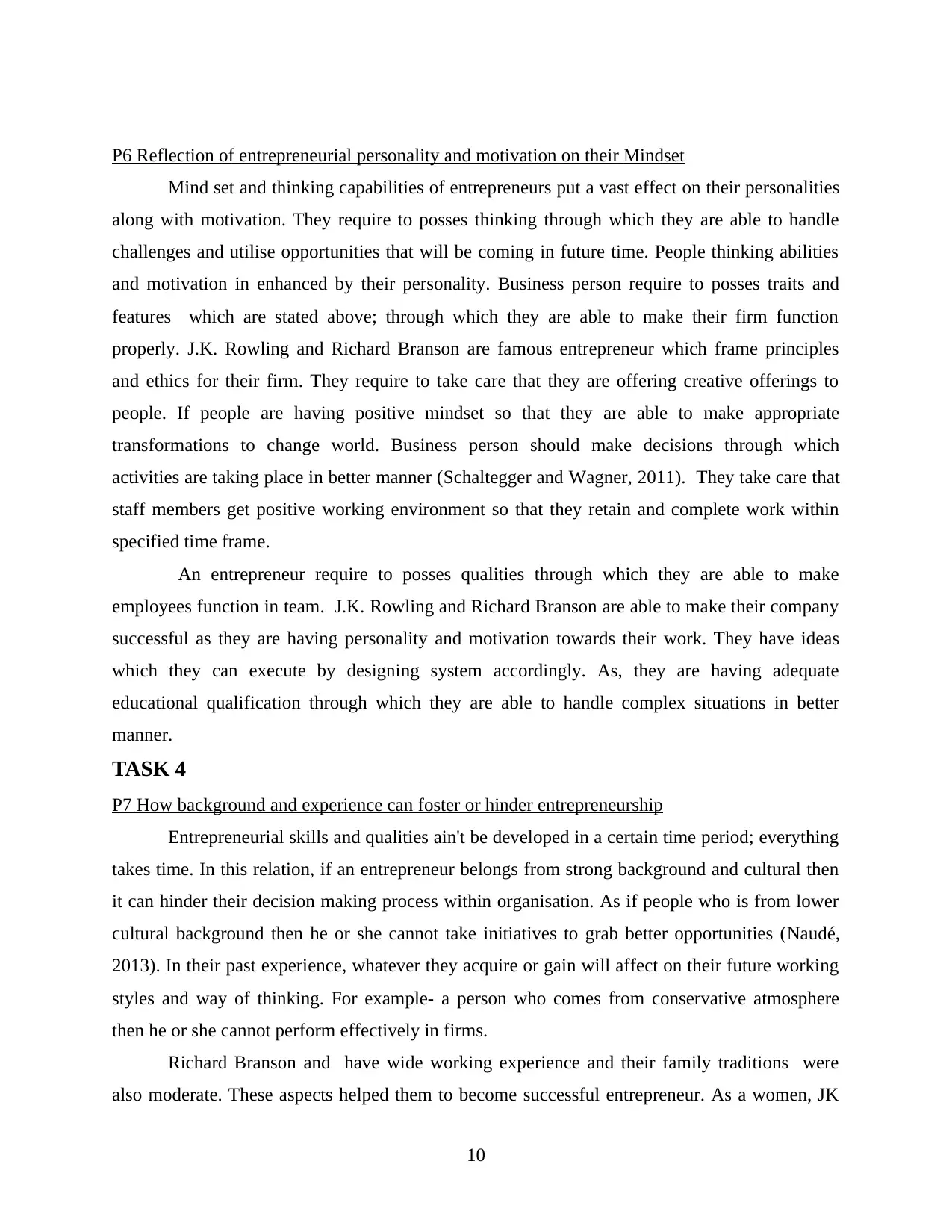
P6 Reflection of entrepreneurial personality and motivation on their Mindset
Mind set and thinking capabilities of entrepreneurs put a vast effect on their personalities
along with motivation. They require to posses thinking through which they are able to handle
challenges and utilise opportunities that will be coming in future time. People thinking abilities
and motivation in enhanced by their personality. Business person require to posses traits and
features which are stated above; through which they are able to make their firm function
properly. J.K. Rowling and Richard Branson are famous entrepreneur which frame principles
and ethics for their firm. They require to take care that they are offering creative offerings to
people. If people are having positive mindset so that they are able to make appropriate
transformations to change world. Business person should make decisions through which
activities are taking place in better manner (Schaltegger and Wagner, 2011). They take care that
staff members get positive working environment so that they retain and complete work within
specified time frame.
An entrepreneur require to posses qualities through which they are able to make
employees function in team. J.K. Rowling and Richard Branson are able to make their company
successful as they are having personality and motivation towards their work. They have ideas
which they can execute by designing system accordingly. As, they are having adequate
educational qualification through which they are able to handle complex situations in better
manner.
TASK 4
P7 How background and experience can foster or hinder entrepreneurship
Entrepreneurial skills and qualities ain't be developed in a certain time period; everything
takes time. In this relation, if an entrepreneur belongs from strong background and cultural then
it can hinder their decision making process within organisation. As if people who is from lower
cultural background then he or she cannot take initiatives to grab better opportunities (Naudé,
2013). In their past experience, whatever they acquire or gain will affect on their future working
styles and way of thinking. For example- a person who comes from conservative atmosphere
then he or she cannot perform effectively in firms.
Richard Branson and have wide working experience and their family traditions were
also moderate. These aspects helped them to become successful entrepreneur. As a women, JK
10
Mind set and thinking capabilities of entrepreneurs put a vast effect on their personalities
along with motivation. They require to posses thinking through which they are able to handle
challenges and utilise opportunities that will be coming in future time. People thinking abilities
and motivation in enhanced by their personality. Business person require to posses traits and
features which are stated above; through which they are able to make their firm function
properly. J.K. Rowling and Richard Branson are famous entrepreneur which frame principles
and ethics for their firm. They require to take care that they are offering creative offerings to
people. If people are having positive mindset so that they are able to make appropriate
transformations to change world. Business person should make decisions through which
activities are taking place in better manner (Schaltegger and Wagner, 2011). They take care that
staff members get positive working environment so that they retain and complete work within
specified time frame.
An entrepreneur require to posses qualities through which they are able to make
employees function in team. J.K. Rowling and Richard Branson are able to make their company
successful as they are having personality and motivation towards their work. They have ideas
which they can execute by designing system accordingly. As, they are having adequate
educational qualification through which they are able to handle complex situations in better
manner.
TASK 4
P7 How background and experience can foster or hinder entrepreneurship
Entrepreneurial skills and qualities ain't be developed in a certain time period; everything
takes time. In this relation, if an entrepreneur belongs from strong background and cultural then
it can hinder their decision making process within organisation. As if people who is from lower
cultural background then he or she cannot take initiatives to grab better opportunities (Naudé,
2013). In their past experience, whatever they acquire or gain will affect on their future working
styles and way of thinking. For example- a person who comes from conservative atmosphere
then he or she cannot perform effectively in firms.
Richard Branson and have wide working experience and their family traditions were
also moderate. These aspects helped them to become successful entrepreneur. As a women, JK
10
⊘ This is a preview!⊘
Do you want full access?
Subscribe today to unlock all pages.

Trusted by 1+ million students worldwide
1 out of 15
Related Documents
Your All-in-One AI-Powered Toolkit for Academic Success.
+13062052269
info@desklib.com
Available 24*7 on WhatsApp / Email
![[object Object]](/_next/static/media/star-bottom.7253800d.svg)
Unlock your academic potential
Copyright © 2020–2026 A2Z Services. All Rights Reserved. Developed and managed by ZUCOL.





